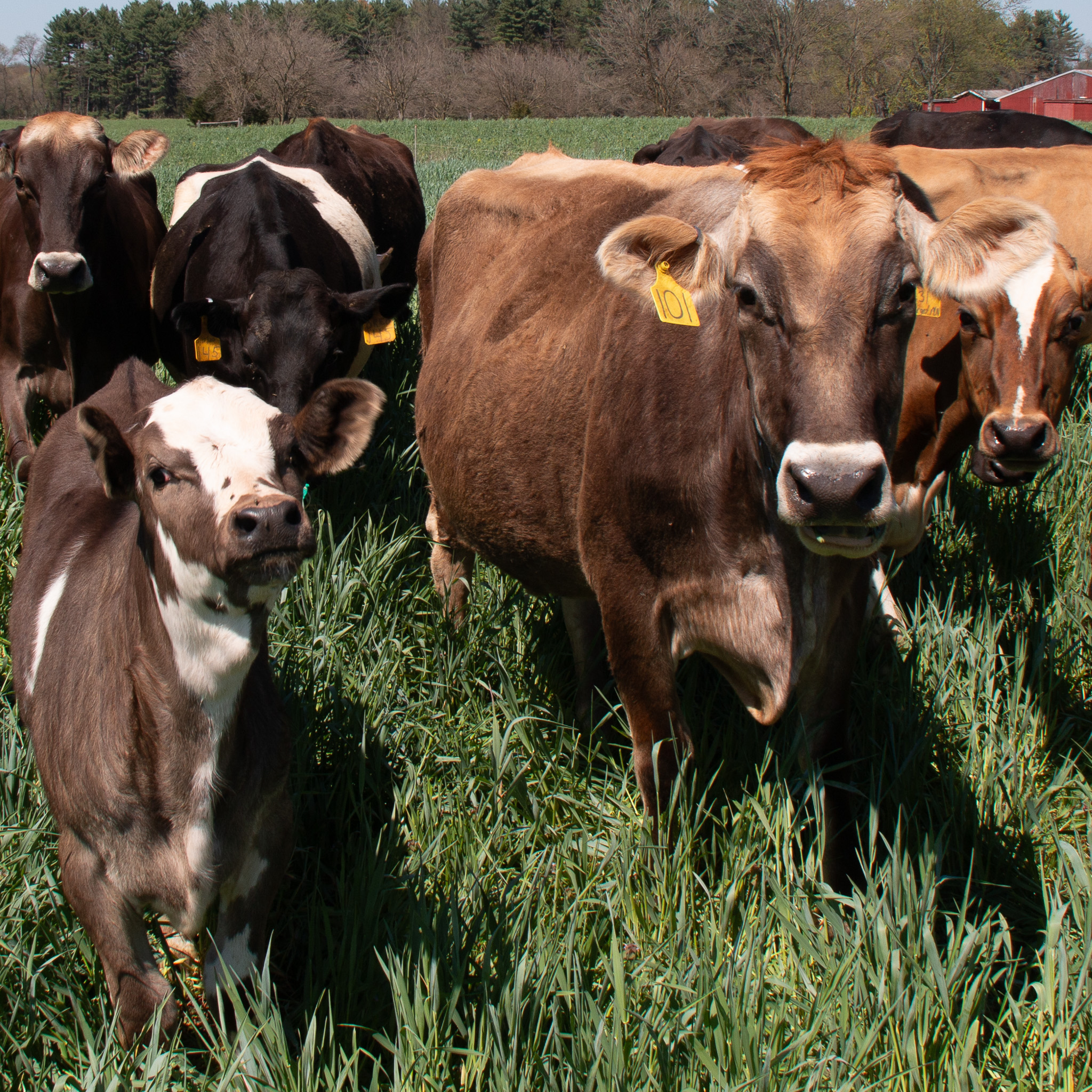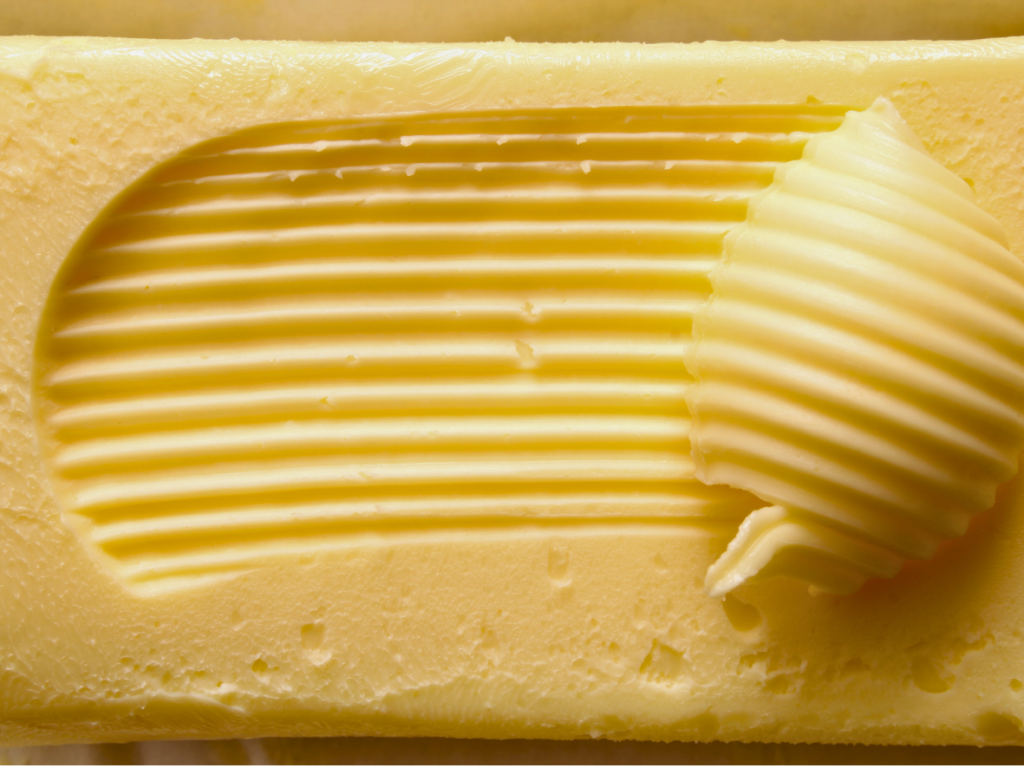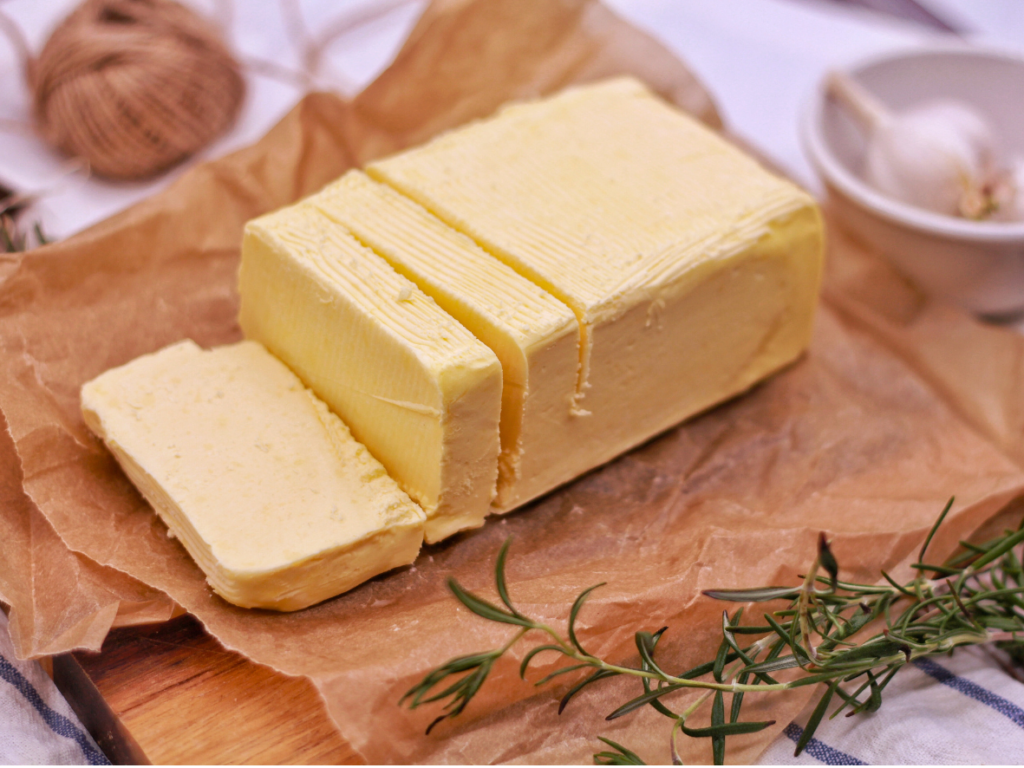
Grass fed butter has been gaining popularity for the last several years, and for good reason. Not only is it creamy, smooth, and delicious, it also offers a plethora of incredible health benefits. If you are tired of conventional butter options full of preservatives and chemicals and are looking for a natural butter that will leave you feeling great, this is for you! We dive deep into the specific benefits of grass fed butter and answer your questions and concerns. From learning about essential vitamins to finding out the benefits of CLA, we cover it all for you! Ready to start transforming your health by indulging in clean and simple grass fed butter? Let’s go!
Is Grass Fed Butter Healthy?
Before going anywhere, we must properly answer this question. Simply put, yes! Butter has often received a bad rap for its high fat content and for this reason, some people avoid consuming it. However, our body craves the natural healthy fats that are found in butter. Butter That said, not all butter is created equal. Grass fed butter stands out from the rest for so many reasons. Grass-fed butter does not contain the chemicals and preservatives that most conventional butter options contain and because the cows only eat grass, the butter is richer in nutrients and vitamins. The clean, simple nature of grass-fed butter helps your body to digest it better, and it packs your body full of vitamins, antioxidants, and omega-3 fatty acids. It is a beneficial part of a balanced diet, especially when used in moderation as part of a whole foods approach to eating. Now let’s break down the specific vitamins, nutrients, and health benefits in grass fed butter.
Essential Vitamins in Grass Fed Butter
Grass fed butter is chock full of essential vitamins, meaning that every bite will benefit your body. Here is a list of the important vitamins contained in grass fed butter.
- Vitamin K2: Don’t underestimate the power of this vitamin which is essential for bone health and cardiovascular strength. If you want a strong heart and healthy bones, you need to consume lots of Vitamin K2. Luckily, grass fed butter is bursting with it!
- Vitamin A: If you are attempting to strengthen your vision and organs, then Vitamin A is what you need! Vitamin A in grass fed butter is typically present in the form of retinol, which is the active form of the vitamin, making it easier for the body to digest and utilize.
- Vitamin E: This is a powerful vitamin that enables the body to fight against infection and boosts your immune system. It is essential for your body for the health of your brain, blood, and skin. And it is overflowing with antioxidants that improve your health!
- Vitamin D: Grass-fed butter also contains small amounts of vitamin D, which is crucial for calcium absorption, bone health, and immune function. Vitamin D plays a role in regulating mood and reducing inflammation.

Grass Fed Butter Nutrients
Farm fresh grass fed butter also contains plenty of other nutrients in addition to the many vitamins present. Nutrients like butyrate, minerals, and antioxidants all make grass fed butter one of nature’s superfoods. Keep reading to find out the nutrients that can benefit your body!
- Butyrate: This is a type of fatty acid that helps to:
- Support the gut lining. The cells that line the intestines need butyrate to strengthen and maintain the gut lining.
- Reduce inflammation. Butyrate reduces inflammation, particularly in the gut, leading to overall gut health.
- Support healthy gut bacteria.Butyrate promotes the growth of beneficial gut bacteria, which are essential for digestion, nutrient absorption, and overall immune health.
- Minerals:
- Calcium: While not a major source of calcium, grass-fed butter contains some calcium, which is important for bone health, nerve function, and muscle contraction.
- Magnesium: Magnesium plays a role in muscle function, nerve transmission, and bone health.
- Phosphorus: This is very important for the formation of bones and teeth, as well as energy production and cell function.
- Zinc: You don’t want to miss any of this essential mineral which supports immune function, protein synthesis, and wound healing. Grass fed butter has you covered with its contents full of zinc!
- Antioxidants
- Grass-fed butter contains various antioxidants, including beta-carotene which contribute to its yellow-orange color. These antioxidants help protect the body from damage and support eye and skin health. Enjoy health with every bite of creamy delicious grass fed butter!

Additional Grass Fed Butter Health Benefits
While the vitamin and nutritional value of grass fed butter would be enough to convince us of its power, the health benefits don’t stop there! Grass fed butter is also connected with lower cholesterol levels and is rich in CLA, an healthy fatty acid that has multiple health benefits. Keep reading to find out more about these benefits!
CLA in Grass Fed Butter
If you’ve never heard of CLA, don’t worry! CLA stands for conjugated linoleic acid, which is a polyunsaturated fat that is found in the fat of ruminant animals like sheep, goats, and cows. While it can be produced industrially in the form of supplements, the real health benefits come when it is a naturally occurring fat, like grass fed butter. Grass fed animals have higher concentrations of CLA than grain fed animals because the fresh grass leads to better-quality fat content in their milk. Grass fed butter rich in CLA has these benefits:
- Heart health: One of the main benefits of CLA rich food like grass fed butter is heart health. The rich antioxidants and anti-inflammatory properties strengthen your heart muscles. Keep your heart healthy by trying grass fed butter today!
- Muscle and immune system support: We all want our bones, muscles and immune system to be healthy and strong. Grass-fed butter is a great source to support all of these things. Say hello to health and vitality with every bite!
- Anti-inflammatory properties: Unlike most omega 6 fatty acids that can promote inflammation if eaten in excess, CLA actually contains anti-inflammatory properties that benefit the heart and body.
Linking Grass Fed Butter and Lower Cholesterol Levels
As mentioned earlier in this article, some people have steered clear of butter because of the idea that butter will increase your cholesterol levels. While this may hold true for most conventional butter options that are full of omega 6 fatty acids, grass fed butter can actually lower your cholesterol levels, due to the balance of omega 3 and omega 6 fatty acids. A grass diet causes animals to produce higher levels of milk, yet not fat, meaning higher health benefits. Our bodies need healthy fatty acids like omega 3 to balance our cholesterol levels and thankfully, grass fed butter is full of them! However, it is important to note that like anything else, grass fed butter should be consumed in moderation.

Common Questions about Grass Fed Butter
As more people incorporate grass fed butter into their diets, several questions arise about its health benefits and how to use it. Below, we’ll address some of the most frequently asked questions.
What Does 100% Grass Fed Butter Mean?
A popular term now heard often in the food industry today is “grass-fed.” Sadly, there are myths and misconceptions around what that actually means. So let’s break it down a bit. Simply put: 100% grass fed means animals like cows and goats that get their source of food only from pastureland or grass. Additional food like grain is not included in their daily diet. Cows and goats are free to roam through the pasturelands and gain their nutrition naturally, rather than through supplements or grains. Some companies just slap grass fed labels onto their products, even though there is often grain or other supplements in the animal’s diet. Because of this, it is essential to find companies that value transparency in their dairy production before anything else.
Is Grass Fed Butter in Coffee Good for You?
If you’ve heard of the popular “bulletproof coffee” trend that consists of putting butter in coffee, you may be questioning its health benefits. In moderation, this is actually a beneficial drink! Adding grass fed butter to coffee provides a source of healthy fats that can help boost energy levels, improve mental clarity, and keep you full for longer periods. The combination of caffeine and the fats in the butter can help stabilize blood sugar levels and prevent the energy crashes that sometimes follow a regular cup of coffee. It’s important to balance your overall fat intake and not overdo it on high-calorie beverages. But in reasonable portions, this is an excellent way to incorporate grass-fed butter into your daily life!
What Is The Difference Between Organic Butter and Grass Fed Butter?
Sometimes people can confuse organic with grass fed, but it is important to note they are different! Organic butter means that the milk has come from animals that have been not fed with any chemicals, hormones, or antibiotics. However, this does not mean they are solely grass fed! Animals on an organic diet have usually been fed some grain, although it is organic feed, without any chemicals in it. While still very delicious and healthy, it does not offer all the nutritional value of 100% grass fed butter.
How Much Grass Fed Butter Should You Have Per Day?
If you are now convinced of the power of consuming grass fed butter, you could be wondering how much butter is healthy for a balanced diet. Although grass fed butter is bursting with vitamins and many health benefits, it is a type of fat and should not be consumed in excess. Most experts recommend 1-2 tablespoons of grass fed butter per day. While this is the recommended amount, factors like age, weight, and medical history could impact this. You can get your daily quota of grass fed butter through putting it into your coffee, slathering it on sourdough bread, or using it in your baking recipes.
Incorporating grass fed butter into your daily diet is an excellent choice because of the health benefits in every bite. From essential vitamins to rich nutrients, and a clean, simple flavor profile, grass fed butter is for you! If you are interested in having farm fresh grass fed butter produced by family run Amish farms, contact us, or browse our selection of grass-fed butter options! Here at Swiss Villa, we are committed to providing you with the highest quality products that will transform your health and leave you satisfied with every bite.
How is Grass Fed Butter Made?
- Milk Collection and Pasteurization: First farms collect fresh milk from cows and goats that have been only grass fed, and gently pasteurize it to get rid of any unhealthy pathogens or bacteria. The milk then cools and the cream is separated out.
- Churning: Next farmers churn all the fresh cream and agitate the cream to create smooth delicious butter. If they are making cultured butter, they add live cultures and let it create healthy bacteria.
- Washing and Flavoring: Then companies have to “wash” the butter with cold water to get rid of any remaining buttermilk. This step helps extend the shelf life of the butter. Some also add celtic sea salt for maximum flavor into our salted options, or leave it unsalted.
Packaging: Then companies package it, label it, and sell it directly to you. Fresh grass-fed butter straight to your doorstep!
Ready To Buy Your Own Grass Fed Butter Online?
At Swiss Villa we have grass fed cow butter, grass fed cultured cow butter and grass fed goat butter!

